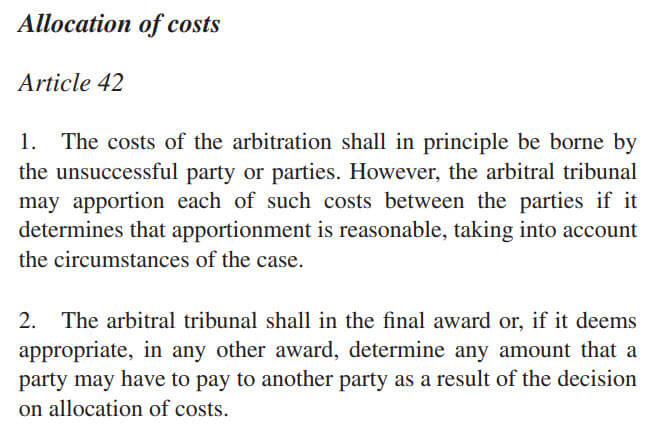Costs tend to be a major concern for users of international arbitration. However, a successful party may recover them in full or in part, including the costs of legal representation. In this respect, both national arbitration legislation and institutional rules generally grant arbitrators the power to award the costs.
Though the UNCITRAL Model Law is silent on the subject of the allocation of arbitration costs, there is no question that, absent contrary agreement, it permits arbitrators to make awards of the costs of the arbitration and legal costs.[1]
At the same time, a number of States that have adopted the Model Law have added provisions regarding awards of the costs of arbitration.[2] Thus, the English Arbitration Act of 1996 introduced a provision adhering to the principle that costs should follow the event:[3]
Award of costs.
(1) The tribunal may make an award allocating the costs of the arbitration as between the parties, subject to any agreement of the parties.
(2) Unless the parties otherwise agree, the tribunal shall award costs on the general principle that costs should follow the event except where it appears to the tribunal that in the circumstances this is not appropriate in relation to the whole or part of the costs.
Arbitral tribunals are able to deviate from the general principle, however, which is dependent on the facts of each arbitration and the conduct of the parties.[4]
Most institutional rules expressly grant arbitral tribunals the power to award the costs of arbitration. The 2010 UNCITRAL Rules provide for a general principle that the prevailing party will be entitled to its costs:[5]
Article 42
- The costs of the arbitration shall in principle be borne by the unsuccessful party or parties. However, the arbitral tribunal may apportion each of such costs between the parties if it determines that apportionment is reasonable, taking into account the circumstances of the case.
- The arbitral tribunal shall in the final award or, if it deems appropriate, in any other award, determine any amount that a party may have to pay to another party as a result of the decision on allocation of costs.
The costs of arbitration include the “legal and other costs incurred by the parties in relation to the arbitration” but only “to the extent that the tribunal determines that the amount of such costs is reasonable”.[6]

The 2017 ICC Rules provide that the final award shall fix the costs of the arbitration and decide which of the parties shall bear them or in what proportion.[7] In making decisions as to costs, the arbitral tribunal may take into account such circumstances as it considers relevant, including the extent to which each party has conducted the arbitration in an expeditious and cost-effective manner.[8] The arbitration costs also include the reasonable legal and other costs incurred by the parties for the arbitration.[9]
The 2014 LCIA Rules also provide that in the absence of a final settlement of the parties’ dispute regarding liability for the arbitration costs, the arbitral tribunal shall decide the proportions in which the parties shall bear them.[10] The arbitral tribunal has the power to decide by an award that all or part of the legal or other expenses incurred by a party be paid by another party and the amount of such legal costs on such reasonable basis as it thinks appropriate.[11]
In addition, the LCIA Rules follow the English approach that the costs follow the event. Thus, its Article 28(4) expressly provides that the arbitral tribunal shall make its decisions on both arbitration costs and legal costs on the general principle that costs should reflect the parties’ relative success and failure in the award or arbitration or under different issues, except where it appears to the arbitral tribunal that in the circumstances the application of such a general principle would be inappropriate under the arbitration agreement or otherwise. The arbitral tribunal may also take into account the parties’ conduct in the arbitration, including any co-operation in facilitating the proceedings as to time and cost and any non-co-operation resulting in undue delay and unnecessary expense.[12]
To conclude, the allocation of arbitration costs generally depends on the degree of a party’s success in an arbitration. However, since arbitral tribunals have large discretion in this respect, the parties should conduct the proceedings in reasonable, efficient and cost-effective manner.
[1] Gary B. Born, International Commercial Arbitration, 2nd Edition (2014), p. 3088.
[2] Gary B. Born, International Commercial Arbitration, 2nd Edition (2014), p. 3088.
[3] Arbitration Act, 1996, §61 (emphasis added).
[4] Fence Gate Ltd v. NEL Constr. Ltd [2001] 82 ConLR 41(TCC) (English High Ct.).
[5] 2010 UNCITRAL Rules, Art. 42.
[6] 2010 UNCITRAL Rules, Art. 40(2)(e).
[7] 2017 ICC Rules, Article 38(4).
[8] 2017 ICC Rules, Article 38(5).
[9] 2017 ICC Rules, Article 38(1).
[10] 2014 LCIA Rules, Article 28(2).
[11] 2014 LCIA Rules, Article 28(3).
[12] 2014 LCIA Rules, Article 28(4).
